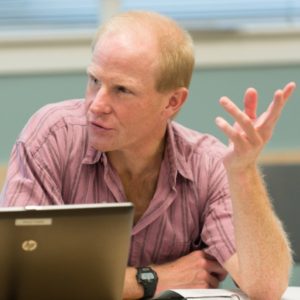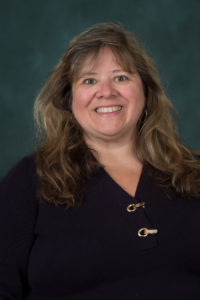Getting REDI: New institute focuses on economics of rural and urban areas
by Beth Etter | April 7, 2017 2:49 PM

“Rural areas are surprisingly entrepreneurial.”
That is one of the findings from Colorado State University Professor Stephan Weiler and his fellow researchers who recently studied startups and business creation in both rural and urban areas. The findings also showed that the businesses created in these rural areas tend to be more resilient than urban startups and have higher survival rates (1990-2007).
Linking rural areas’ lower costs, entrepreneurial culture and amenities to the dynamic nature of high-growth urban clusters such as those along Colorado’s Front Range can benefit both cities and smaller towns, the study found.
These findings, and many more, about the relationship between and differences among rural and urban areas are the foundation of the newly created Regional Economic Development Institute, or REDI.
Rise of the Gig Economy
REDI periodically publishes short research briefs on issues affecting Colorado and national economies.
Read the first one – Inside the Rise of the Gig Economy[1] – at the REDI website.
redi.colostate.edu
About REDI
Weiler, a longtime faculty member in the Department of Economics, has used his position as William E. Morgan Endowed Chair within the College of Liberal Arts to create REDI. He is partnering with Dawn Thilmany, a nationally recognized faculty-scholar in CSU’s Department of Agricultural and Resource Economics, and a core team of researchers to launch this new initiative. REDI aims to understand, analyze and inform economic development strategies in struggling rural and urban areas, especially in Colorado, through engaged research.
 [2]
[2]By studying both rural and urban areas, the researchers will be able to identify overlaps and synergies that may be key to unlocking untapped potential for economically marginalized populations in both city and country contexts. Thilmany notes that “although farming and ranching only directly involve about 2 percent of our households, the broader food and beverage industry, ag, heritage- and natural-based tourism, and other enterprises and innovations linked to rural areas and agriculture are key drivers and cultural touchpoints for our rural communities.”
The Institute takes a broad view of regional development, incorporating the role of culture and the arts in a region’s cohesion and livability. Weiler emphasizes that “we are particularly excited about combining economic features with broader quality-of-life factors in understanding economic development. Living in Colorado, we fully recognize the value of natural amenities in attracting and keeping talent, but all areas can use recreational and creative amenities to create foundations for thriving economies and communities.”
 [3]
[3]Current projects
Current CSU-related projects that the Institute is focused on include the National Western Center neighborhood reunification and redevelopment project in Denver, the APLU Innovation and Economic Prosperity agenda from CSU President Tony Frank, and other challenges in Colorado and beyond. A regular series of brief REDI reports will highlight evolving research across the Institute’s diverse topic areas:
- Entrepreneurship
- Food Systems and Agriculture
- Innovation
- Urban Development
- Rural Development
- Livable Communities
In addition to a focus on Colorado and the United States, the Institute has partnered with the University of Birmingham in England, where the business school has invested in a similar research-oriented City-REDI. This relationship will lead to cross-authored publications and research that will address economic challenges and development prospects that can translate across the globe. Ultimately, the goal is to make the Institute a natural partner for public, private and nonprofit organizations seeking to promote sustainable regional economic development and to be recognized as a leading global source of cutting-edge urban, rural and regional economics scholarship.
The team
REDI has an internal and external team of researchers, as well as both a Colorado Advisory Council and External Advisory Board, and was granted University institute status by Faculty Council in March. The core team includes:
Director:
Stephan Weiler, Economics
Associate Director:
Dawn Thilmany, Ag/Resource Economics
Research Associates:
Alexandra Bernasek, Economics
Patrick Fahey, Art
Greg Graff, Ag/Resource Economics
Rebecca Hill, Ag/Resource Economics
Becca Jablonski, Ag/Resource Economics
David Mushinski, Economics
Anita Pena, Economics
Sammy Zahran, Economics
Learn more about REDI and read its research briefs at redi.colostate.edu[4].
Research with national impact
Stephan Weiler recently co-authored a piece for The Conversation[5], “Six charts that illustrate the divide between rural and urban America.”
His section of the article, titled, “Rural areas are surprisingly entrepreneurial,” was written with Tessa Conroy and Steve Deller, Professors of Economics, University of Wisconsin-Madison.
Read the full text online[6].
The William E. Morgan Endowed Chair
The William E. Morgan Endowed Chair was created by friends and family of the late president of Colorado State University Bill Morgan, who served from 1949 to 1969. Contributors to the Morgan fund specified that the endowed chair be in the College of Liberal Arts to honor the commitment of Morgan and his wife to support the arts and cultural viability at CSU and in the Fort Collins community. Faculty members are nominated by College of Liberal Arts department chairs, and a committee in the College of Liberal Arts selects the recipient. Recipients of the Morgan chair must have an excellent teaching record, a strong commitment to and record of research and/or artistry, and a commitment to service and outreach. The William E. Morgan Endowed Chair serves a three-year term and receives $50,000 in funding each year.
- Inside the Rise of the Gig Economy: https://www.libarts.colostate.edu/redi/wp-content/uploads/sites/50/2017/02/REDI-Gig-Economy-1-NK.pdf
- [Image]: http://source.colostate.edu/wp-content/uploads/2017/04/sweiler.jpg
- [Image]: http://source.colostate.edu/wp-content/uploads/2017/04/DawnThilmany.jpg
- redi.colostate.edu: http://redi.colostate.edu
- The Conversation: https://theconversation.com/us
- full text online: https://theconversation.com/six-charts-that-illustrate-the-divide-between-rural-and-urban-america-72934
Source URL: https://source.colostate.edu/getting-redi-new-institute-focuses-economics-rural-urban-areas/
Copyright ©2024 SOURCE unless otherwise noted.